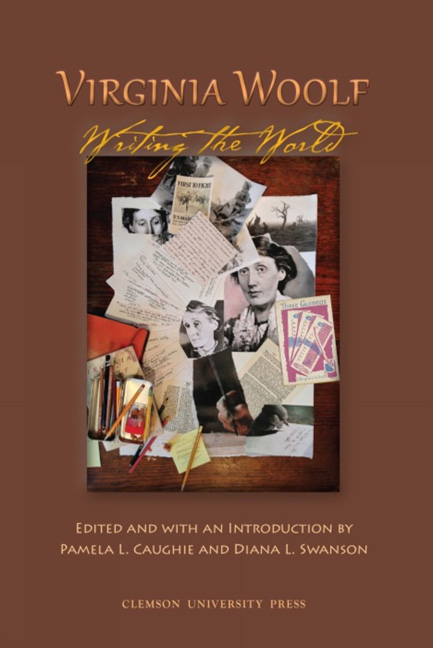Book contents
- Frontmatter
- Table of Contents
- Introduction
- Acknowledgmen
- Abbreviation
- WAR AND PEACE
- WORLD WRITER(S)
- ANIMAL AND NATURAL WORLD
- WRITING AND WORLDMAKING
- Negative Feminism and Anti-Development in Virginia Woolf's The Voyage Out
- Upheavals of Intimacy in To the Lighthouse
- The Reconciliations of Poetry in Virginia Woolf's Between the Acts; or, Why It's “perfectly ridiculous to call it a novel”
- Virginia Woolf, Composition Theorist: How Imagined Audiences Can Wreck a Writer
- The Precarity of “Civilization” in Woolf's Creative Worldmaking
- Notes on Contributors
- Conference Program
- Appendix: Virginia Woolf Conference Exhibit Items, Newberry Library
Upheavals of Intimacy in To the Lighthouse
from WRITING AND WORLDMAKING
- Frontmatter
- Table of Contents
- Introduction
- Acknowledgmen
- Abbreviation
- WAR AND PEACE
- WORLD WRITER(S)
- ANIMAL AND NATURAL WORLD
- WRITING AND WORLDMAKING
- Negative Feminism and Anti-Development in Virginia Woolf's The Voyage Out
- Upheavals of Intimacy in To the Lighthouse
- The Reconciliations of Poetry in Virginia Woolf's Between the Acts; or, Why It's “perfectly ridiculous to call it a novel”
- Virginia Woolf, Composition Theorist: How Imagined Audiences Can Wreck a Writer
- The Precarity of “Civilization” in Woolf's Creative Worldmaking
- Notes on Contributors
- Conference Program
- Appendix: Virginia Woolf Conference Exhibit Items, Newberry Library
Summary
In a recent issue of The New Yorker, James Wood published an article entitled “Why? The Fictions of Life and Death,” tracking his early interest in literature: “Fiction doesn't merely replicate the license you have, within your head, to think what you like. It adds the doubleness of all fictional life. To witness that freedom in someone else is to have a companion, to be taken into the confidence of otherness. We share and scrutinize at the same time; we are, and are not, Raskolnikov, and Mrs. Ramsay, and Miss Brodie, and the narrator of Hamsun's “Hunger,” and Italo Calvino's Mr. Palomar” (36). Wood's observation is apt, but it is too generalizing. It is true that we, as readers, may feel a certain “doubleness” when we locate in a character a behavior or trait with which we identify, when we see in their struggles struggles that we in part share. But not all fictional characters are the same. Raskolnikov and Mrs. Ramsay are both characters we follow, characters whose lives we attempt to track, protagonists, to put it simply, but they are not characters who function novelistically in the same way. And if Wood is blind to the diff erence, Woolf is not. In her 1925 essay, “The Russian Point of View,” Woolf writes that what Russian literature teaches is to “make yourselves akin to people. […] But let this sympathy be not with the mind— for it is easy with the mind—but with the heart” (174). Sympathy of heart is crucial for Woolf's understanding of the diff erence between herself and the Russians, between, more generally, realist fiction of the nineteenth century and modernist fiction of the twentieth century, and she goes on to say that “the assumption that in a world bursting with misery the chief call upon us is to understand our fellow-suff erers” (174) is what Russian literature off ers over the possibilities she now sees for herself. Woolf understands, in other words, that while one of the primary feats of Dostoevsky's novel is the way in which even an average Joe finds himself in the throes of Raskolnikov's morally tortured soul, one of the triumphs of her Mrs. Ramsay is the way in which she resists such finding altogether.
- Type
- Chapter
- Information
- Virginia Woolf: Writing the World , pp. 185 - 190Publisher: Liverpool University PressPrint publication year: 2015



